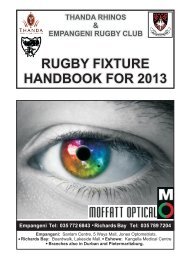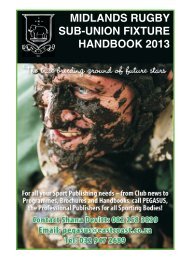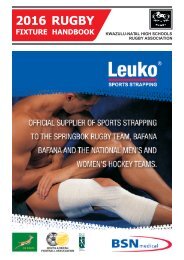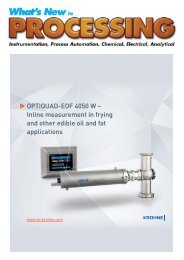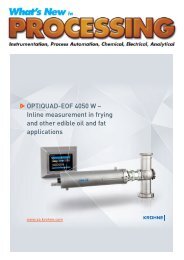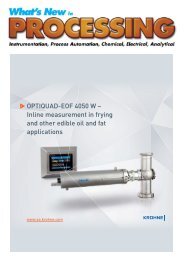Gauteng Cricket Board Blue Book
You also want an ePaper? Increase the reach of your titles
YUMPU automatically turns print PDFs into web optimized ePapers that Google loves.
12. LAW 24 : NO BALL<br />
Free Hits in this Competition shall NOT apply.<br />
Law 24 of the Laws of <strong>Cricket</strong> shall apply with the following additions:<br />
12.1 If a bowler breaks the stumps at the bowlers end in his delivery stride the Umpire shall call and signal NO BALL<br />
12.2 High full tosses<br />
Either umpire shall call and signal “no ball” if any full toss passes, or would have passed, above the waist of the<br />
batsman standing in an upright position.If, in the opinion of the umpire, such a delivery is considered likely to inflict<br />
physical injury on the batsman, the umpire at the bowler's end shall, in addition to calling and signalling no ball,<br />
when the ball is dead, caution the bowler and issue a first and final warning. The umpire shall inform the other<br />
umpire, the captain of the fielding side and the batsmen at the wicket of what has occurred. Should there be any<br />
further instance where a high full pitched ball is bowled and is considered likely to inflict physical injury on the<br />
batsman by the same bowler in that innings, the umpire shall in addition to calling and signalling no ball, when the<br />
ball is dead, direct the captain to take the bowler off forthwith. The over shall be completed by another bowler, who<br />
shall neither have bowled the previous over, or part thereof, nor be allowed to bowl the next over, or part thereof.<br />
The bowler thus taken off shall not be allowed to bowl again in that innings. The umpire(s) / captains(s) will report<br />
the occurrence to the other umpire, the batsman at the wicket and as soon as possible to the captain of the batting<br />
side and the governing authority, i.e. GCB.<br />
12.3 Short pitched deliveries<br />
One short pitch delivery shall be allowed per over, adjudged as having passed over the batsman's shoulder<br />
standing upright at the crease. In the event of a second short pitched delivery in the over, the umpire, after the call<br />
and signal of “no ball” and when the ball is dead, shall caution the bowler and advise the relevant parties. This<br />
caution shall remain in force for the duration of the innings. If there is a further infringement by the same bowler, the<br />
umpire shall, after the call and signal of “no ball” and when the ball is dead, instruct the captain to take the bowler off.<br />
He shall not bowl again in the innings. The over shall be completed by another bowler who is eligible to bowl.<br />
Any short pitched delivery above head height where the batsman is unable to play a normal cricket stroke<br />
shall be called a “wide” and count as the one short pitched delivery allowed in the over.<br />
12.4 Penalty runs<br />
The penalty run for a no ball shall be scored in addition to any runs otherwise scored.<br />
13. LAW 25 : WIDE BALL<br />
13.1 Umpires are instructed to apply a consistent interpretation of this Law in order to prevent negative bowling<br />
wide of the wicket.<br />
13.2 Any delivery not having been struck by the batsman nor having struck his person and not passing within 0.80m<br />
of the outer stumps shall be called “wide ball”. Pitches shall be marked in accordance with the provisions of<br />
12.3 of the By-laws and General Regulations.<br />
13.3 Persistent bowling down the leg side within the 0.80m tolerance or bowling down the leg side that is<br />
considered by the umpire as a negative tactic, will after an initial warning to the bowler, be called a wide.<br />
13.4 A penalty of one run for a wide ball shall be scored. This penalty shall stand in addition to any other runs which<br />
are scored or awarded. All runs which are run or result from a wide ball, which is not a no ball, shall be scored<br />
as wides.<br />
14. FIELDERS<br />
14.1 Limitation of on-side fieldsmen<br />
The number of on-side fieldsmen at the instant of the bowler's delivery shall not exceed 6, not more than 2 of<br />
whom shall be behind the line of the popping crease. If this playing condition is infringed, either umpire shall<br />
call and signal “No Ball” at the instant of delivery or as soon as possible thereafter.<br />
14.2 Movement by fielders<br />
Law 41.7 - Movement by fielders and Law 41.8 Definition of significant movement shall be replaced by the<br />
following: Any movement by any fielder, excluding the wicket keeper, after the ball comes into play and before<br />
the ball reaches the striker, is unfair except for the following:<br />
i. minor adjustments to stance or position in relation to the striker's wicket.<br />
ii. movement by any fielder in the outfield towards the striker or the striker's wicket that does not significantly<br />
alter the fielder's position.<br />
iii. movement by any fielder in response to the stroke that the striker is playing or that his actions suggest he<br />
intends to play. Notwithstanding (iii) above, in all circumstances Law 41.5 (Limitation of on side fielders)<br />
shall apply. In the event of such unfair movement, either umpire shall call and signal Dead ball as soon as<br />
possible after the delivery of the ball.<br />
Note also the provisions of Law 42.4 (Deliberate attempt to distract the striker) and Law 40.4 (Movement<br />
by the wicket-keeper).<br />
14.3 The Wicket-keeper<br />
Law 40.4 shall be replaced by the following:<br />
After the ball comes into play and before it reaches the striker, it is unfair if the wicket-keeper significantly alters<br />
his position in relation to the striker's wicket, except for the following:<br />
(i) movement of a few paces forward for a slower delivery, unless in doing so it brings him within reach of the wicket.<br />
(ii) lateral movement in response to the direction in which the ball has been delivered.<br />
(iii) movement in response to the stroke that the striker Is playing or that his actions suggest he intends to play,<br />
however the provisions of Law 40.3 (Position of the wicket-keeper) shall apply. In the event of unfair<br />
movement by the wicket-keeper, either umpire shall call and signal Dead ball.<br />
GAUTENG CRICKET BOARD BLUE BOOK 2016/2017 SEASON 52




